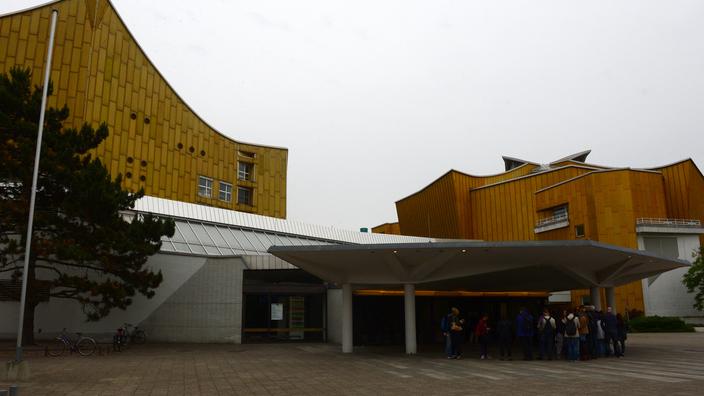The 1000 tickets on sale were torn in three minutes.
After months of music without spectators due to Covid, the Berlin Philharmonic resumed Saturday evening, the time of a concert, with an audience previously tested, and "
that changes everything!"
".
Read also: The latest creation of the Opéra du Rhin can be discovered by ear
At the end of the hour and a half of concert, the emotion was palpable, on stage as in the hall.
Russian conductor Kirill Petrenko and the orchestra of the prestigious Philharmonie received a long standing ovation, after months of withdrawal imposed by the pandemic.
They had just performed
Romeo and Juliet
by Piotr Tchaikovsky and the
Second Symphony
by Serge Rachmaninoff.
“
Attending such a concert in real life changes everything!
Enthusiastically Peter, a thirty-something who came as a couple.
“
I had seen concerts given on video but that has nothing to do with it, even if like me we are crazy about music.
"
"
We played without an audience for months, it's better than nothing but with spectators, it has nothing to do, it's like the difference between 2D and 3D
", confirmed violinist Aleksandar Ivic, delighted to observe his Philharmonic “
with light, well-dressed people waiting in front ...
” “
This shows that the result of a concert, it is us plus the public, which transports us to a state that 'you can't achieve by playing alone
,' he added.
Doctors in combination
As elsewhere in Germany, the health situation is worrying in the capital, with an incidence rate rising to 94.1 on Sunday, further far from the symbolic bar of 100 likely to automatically trigger new restrictions.
But to give "
perspectives
", according to artistic director Andrea Zietschman, to the public and to musicians depressed by a year of remote performance, the Berlin venue has embarked on this "
test project
".
Success was immediately apparent, the 1000 tickets on sale were gone in three minutes.
Just before the concert, Andrea Zietschman took the stage to express “
his emotion and that of the musicians
” to reconnect with real concerts, which give “
energy and inspiration
” to the performers, even if the health situation remains “
fragile
”.
To avoid any risk of contamination, the rules were particularly strict: the purchase of a nominative ticket gave access to a free test taken the same day in one of the five partner centers or even at the Philharmonie, two hours before the concert, for example. doctors in protective suits.
And no representation if you were tested positive, the ticket then being refunded.
But, according to the Philharmonie, this scenario did not happen.
During the concert, wearing a surgical mask was mandatory and every other seat was unoccupied.
Without an intermission, refreshment bar or cloakroom, the movement of the public was reduced to a minimum.
The premises were regularly disinfected and the air constantly renewed by an air conditioning system.
Between each musician, a space of one meter, increased to a meter and a half between those who played a wind instrument.
"
Subordinate rank
"
This test concert is part of a larger program set up by the city of Berlin and involving by April 4 a dozen venues, including theaters, in the capital, almost at a standstill. for a year and with no real prospect of reopening.
The Berliner Ensemble, a theater founded by Berthold Brecht, thus offered a first public play on Friday evening in front of several hundred spectators who were also tested.
“
What is important is that culture gets back on track.
In Spain, in Poland, in Luxembourg, there is theater, opera
”, argued the director of the Berliner Ensemble, Oliver Reese, before the Association of the foreign press.
“
It's the middle of March and we have no idea what's going to happen on April 4 or May.
We cannot stand that
”, he asserted, deploring that Germany has since the beginning of the health crisis relegated culture to a“
subordinate rank
”.

